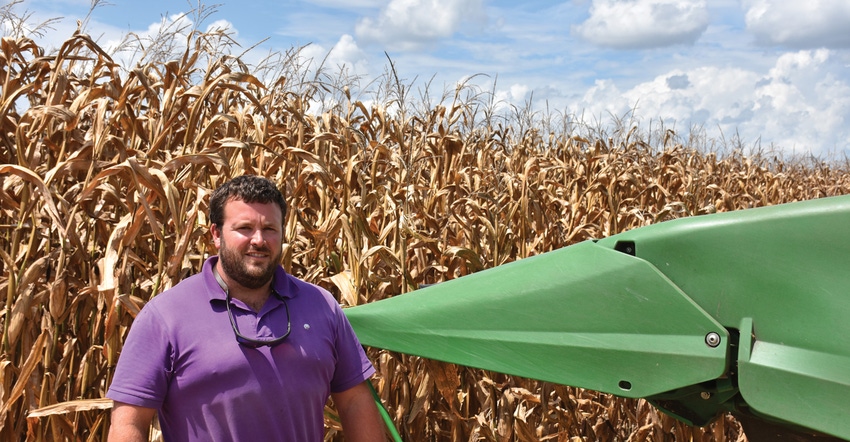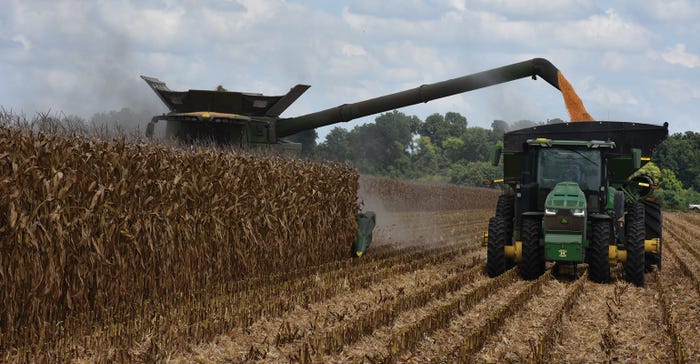
Corn grower Dustin Morris of Rayville, La., had a stop-and-go start to his planting season this year, but given plenty of moisture and sunshine — and some good varieties — it turned out to be a decent year.
“We started planting around the eighth of March and we ran for about five days straight. Then we got rain,” Morris said. “We planted in one- and two-day windows to finish it out, but the only five days we worked in a row were the first five days.”
A cool and wet spring brought plenty of rain to northeast Louisiana and the rest of the Delta, but the weather events that translated to flooding north and east of where Morris farms did not hit him as hard.
“We’ve had a pretty good year,” he said in early August. “We’ve had nice, cooler-than-normal weather and some nice rains. We had some problems with the big rains, but not like others had with the flood events. Overall, I think it’s going to be okay.”
Yields up
At harvest, his yields were coming in about 10% higher than average, he said, due in part to mindful selection of DeKalb varieties his family uses on their operation.
Dustin farms with his father, Todd, and his brother, Patrick. They grow corn on several sites in Richland and East Carroll Parishes and almost 98% of that is irrigated.
They select DeKalb varieties based on what they expect to perform in a particular field. Morris ranks variety selection as the most important factor in their planting decisions.
“The number one most important thing we do all year is picking the right variety for the right acre,” he said. “Knowing which variety fits certain fields and tailoring those varieties to those fields is extremely important to our operation.”
There is some variability in soil across the ground Morris farms, so knowing which variety works best in those soil types is important.

“We do strip trials on the farm every year,” he said. “I do that because I believe that there’s no data better than your data. Then you see what works on your farm. What works on your farm might not work on the next guy’s farm and vice versa. So, to see it in your environment and your style, it tells a really good story.”
Morris said that his seed planting rates are based on the yield potential of the recommended variety. He does not vary that rate within individual fields but may change the rate and the variety in a field depending on the soil type.
Variety performance
One variety that has performed well for Morris is DKC70-27.
DKC70-27 contains DeKalb VT Double PRO which has dual modes of action for protection against pests. Weed protection is provided through glyphosate tolerance. In addition, the variety offers foliar disease tolerance that works well for Morris.
“We grow a fair amount of corn on corn,” he said. “So, that puts you in a naturally high-disease environment. With DKC70-27 you have a product that has a very good disease package. That helps you sleep at night, knowing that you don’t have to be as on top of applying a fungicide as you would on other varieties.
“It’s a full season variety and has a lot of yield potential. The top end yield potential on it is extremely high. So, it fits.”
With that bit of variability in soil type across their operation, Morris also relies on other varieties including DKC65-95, DKC65-99, DKC65-93, and DKC62-05.
“It depends on where I’m planting and what the yield expectations are for that particular field on that particular farm,” he said. “And, it depends on what the previous crop was. Some seem to do better in a corn behind corn situation, where others have performed better behind soy or cotton or another crop.”
All of which points to the importance of knowing the varieties or working with someone who does, including crop consultants, Extension or DeKalb product reps.
Nutrition is important
Morris said that it’s important to keep an eye on nutrition.
“Our prescriptions are all written based on the yield goal for each field,” he said. “We put out a lot of potash. These soils don’t have a lot of holding capacity, so we have to put out a lot of potassium.”
Nitrogen applications are split up throughout the season depending on need.
Regarding pests, Morris watches for stinkbugs, but they don’t have any major pest problems in corn other than disease. Variety plays an important role in disease control, he says, placing the right variety where it counts.
“All the varieties that we plant have a really strong disease package, therefore we’re not having to pay as close attention to the disease as we have in the past,” he says.
Morris notes that DeKalb is continuing to advance and move forward with a lot of testing in corn.
“What is exciting about today is that these varieties are changing so fast,” he said. “The old MO was you’d plant 40 bags of a variety this year and look at it. If it was good you’d increase it. If it did it again, then it might be a staple.
“We’re just doing everything a lot quicker now because you feel better about what they’re bringing to you. You don’t have to take as long to know that it’ll work. It just seems like things are changing at such a rapid pace, we’re changing varieties really quickly. That’s good.”
He also notes that DeKalb is breeding corn specifically for the Midsouth region.
“They have a breeding facility in central Mississippi,” he said. “It’s good to see them breeding for this area and not just adapting a variety from somewhere else. They’re breeding varieties for this area and for our farm. It’s nice.”
About the Author(s)
You May Also Like






